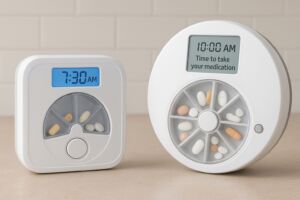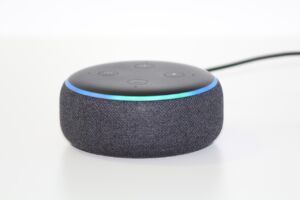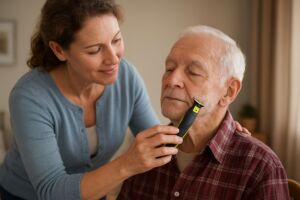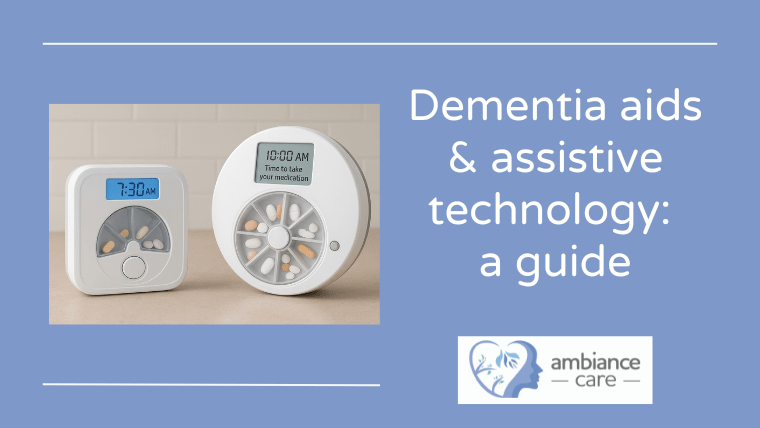Aids and assistive technology for dementia: a guide
There are lots of ways to help loved ones live better and more independently with dementia, including dedicated aids and assistive technologies, and this is what we’re going to focus on in our blog post.
We regularly discuss with our clients how advances in technology and lifestyle products can support individuals with dementia and their families, and many are surprised by just how much help these handy gadgets and gizmos can provide.
In this post, we’ll run through some of the dementia aids and assistive technologies we regularly recommend to our families and use with our clients – these are tried and tested by our team and given the Ambiance Seal of Approval.
Timed medication dispensers
 Making sure our loved ones take their medication, and take it on time, is vitally important. It often falls to families to organise or oversee medication-taking, which can add to the strain of caring for a loved one with memory loss.
Making sure our loved ones take their medication, and take it on time, is vitally important. It often falls to families to organise or oversee medication-taking, which can add to the strain of caring for a loved one with memory loss.
Timed medication dispensers are ideal in this scenario, from four-day dosettes ideal for taking on a short break to dispensers that can be filled with up to a month’s medication. These handy devices can be programmed to open at set times on set days, sounding an alarm, music, or pre-recorded message when the compartment opens.
Some timed medication dispensers can even send an SMS message to a preferred phone number with updates when a dose is taken, missed, or when doses in the tray reach a certain level.
Alexa and home assistant technology
 Home assistant technology like Alexa and Siri can be particularly useful in helping people living with dementia maintain their independence at home. These virtual tools can assist with reminders, routine, safety, entertainment and more, giving an individual a level of support that can improve their day-to-day living.
Home assistant technology like Alexa and Siri can be particularly useful in helping people living with dementia maintain their independence at home. These virtual tools can assist with reminders, routine, safety, entertainment and more, giving an individual a level of support that can improve their day-to-day living.
Alexa can be used to set up voice-activated reminders to eat meals, take medication or attend appointments, to remotely turn lights or devices on or off, and the ‘drop-in’ feature enables instant, two-way conversations with a loved one who may struggle to use a phone.
It’s also possible to create shopping lists, play music or relaxing sounds, showcase photo slideshows, display the time in a clear format, and participate in trivia games through home assistant technology – it really does have an abundance of uses.
Electronic memory boards
Digital memory boards are an effective way to stay connected with a loved one who has dementia and help reduce feelings of isolation. Electronic memory boards are tablet devices with high-contrast, large-font displays to highlight messages and photos sent over by family or friends.
These electronic gadgets can promote independence and connection, displaying reassuring notes, reminders about events or appointments and allowing family or friends to communicate in real time by sending messages.
Memory boards usually connect to the Wi-Fi and are accessed via an app that family, friends and caregivers can download to get in touch with a loved one in just a few taps.
Jubilee TV
Designed to simplify the television experience for older adults, Jubilee TV is an app that works with a regular TV and compatible source device to allow family, friends and caregivers to control their loved ones’ TV remotely.
That’s not all, though. The handy app also enables direct-to-TV videocalling with an auto answer function, and also has a drop-in capability that facilitates checking in on a loved without disruption via a one-way video and audio feed.
Smart monitoring and alerts mean those with access can see when the TV is used and for how long, as well as when someone enters or exits the room. It’s also possible to send helpful medication reminders, notes, photos and videos directly to the person’s TV screen.
Daily Sparkle
The Daily Sparkle is an award-winning reminiscence newspaper that includes articles, quizzes, jokes and exercise ideas to enrich the lives of older adults and people living with dementia. It’s supported by organisations like the NHS, Age UK and Dementia UK and available on a subscription basis with a free trial.
Along with the daily newspaper, there are weekly versions, a monthly magazine, a sporting paper and Sensory Sparkle, designed for individuals with more advanced dementia.
The magazines help prompt conversation and meaningful connection, enhancing a person’s wellbeing through cognitive stimulation and reminiscence. It’s a wonderful way to get loved ones talking about memorable moments from times they remember fondly.
Philips OneBlade
 Getting older doesn’t mean individuals no longer take pride in their appearance – many of our gentlemen clients still want to look and feel fresh-faced, which is where the Philips OneBlade has proved invaluable.
Getting older doesn’t mean individuals no longer take pride in their appearance – many of our gentlemen clients still want to look and feel fresh-faced, which is where the Philips OneBlade has proved invaluable.
The OneBlade is a hybrid electric styler that provides a close shave without the dangers of a manual razor. Many of our clients with dementia are able to use the OneBlade themselves, while those with more advanced dementia still enjoy the experience of shaving supported by caregivers or family members.
With wet or dry functionality, the OneBlade has a glide coating, rounded tips and 360° coverage. Blades last for up to four months – a handy eject symbol appears when it’s time to replace.
Founder Diane says: “When I first became a dementia caregiver, I wasn’t aware of the wide range of aids out there that can help someone with dementia (and their families) live a little better in the day-to-day. I know I would have liked to know about these sooner – hopefully, the list we’ve put together here will really help others in a similar position become more aware of the aids and appliances that can support individuals and families on the dementia journey.”
For more information about assistive technology and dementia aids, our advice service is designed to find you the answers you need – get in touch with us and we’ll be happy to help.


